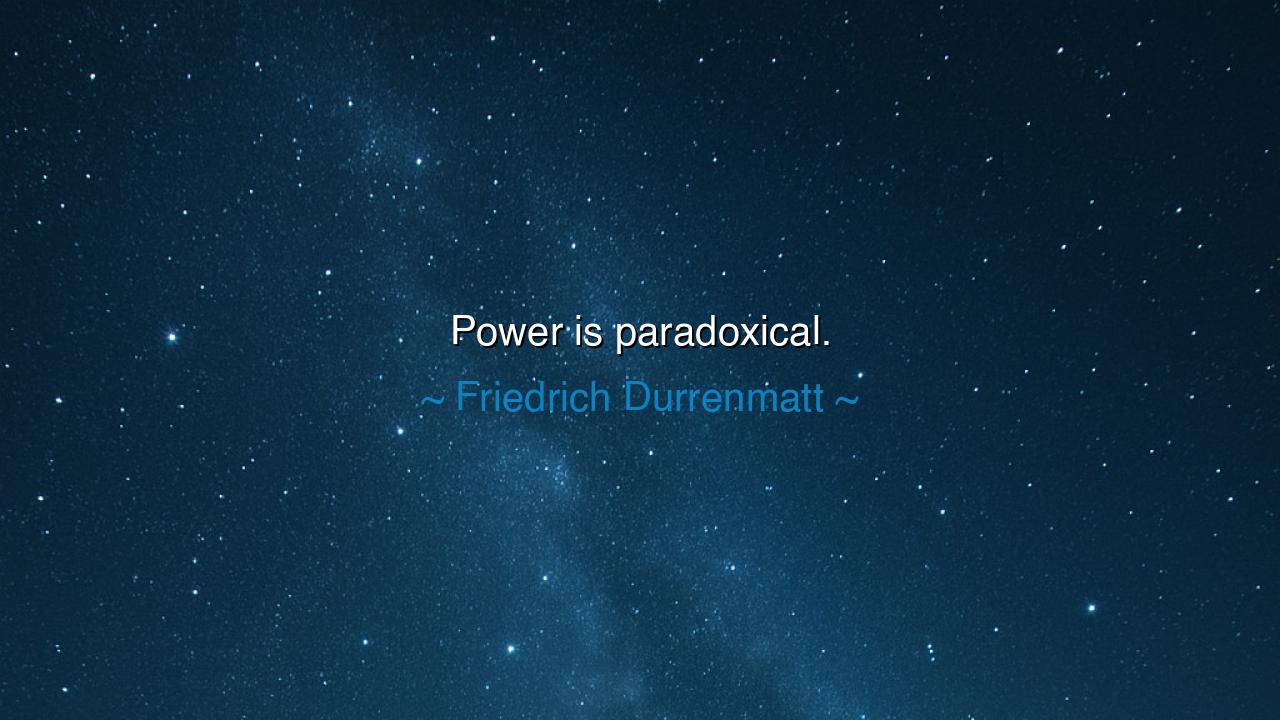
Power is paradoxical.






Friedrich Dürrenmatt, the Swiss dramatist who probed the shadows of human ambition, declared with piercing brevity: “Power is paradoxical.” In these words he captures the eternal riddle of authority—that it both elevates and enslaves, strengthens and corrupts, protects and destroys. To grasp power is to seize something that never belongs wholly to the one who holds it. It appears as mastery, yet it binds its wielder in chains of responsibility, suspicion, and inevitable downfall.
The paradox lies here: the more power one gathers, the less freedom one possesses. Kings must fear conspiracies, generals must sleep beside their armies, rulers must bend beneath the expectations of nations. What seems at first a crown of gold soon reveals itself as a crown of iron. Thus power is both treasure and burden, both weapon and weakness. Dürrenmatt, who wrote of tyrants, judges, and fallen heroes, knew well that those who ascend too high are often the first to fall.
History gives us countless proofs. Consider Julius Caesar, whose march toward supreme command was paved with victories. Yet the very height of his power brought daggers to his side in the Senate. The authority that made him unassailable also made him unbearable to those beneath him. His fall was not despite his power, but because of it—the paradox revealed in blood upon the floor of Rome.
So too with the mighty Soviet Union. Its reach extended across continents, its armies vast, its influence immense. Yet the greater its power, the more fragile it became, weighed down by fear, oppression, and the inability to bend. In seeking absolute control, it sowed the seeds of its own collapse. Once more the paradox was fulfilled: what seems unshakable is already trembling.
O children of tomorrow, let Dürrenmatt’s words burn in your memory: power is paradoxical. Seek it not as salvation, for it is both gift and curse. To wield it wisely, one must remember that its strength is fleeting, its glory unstable, its burden immense. The true measure of greatness is not in how much power one holds, but in how one bears the paradox—tempering force with humility, authority with justice, and command with mercy. Only then can power serve rather than devour.






TDBui Thi Dung
I’m intrigued by the concept of power as paradoxical because it implies a constant tension between control and vulnerability. It makes me question the true nature of influence: do we ever fully possess it, or is it always conditional and fleeting? Could exploring this paradox help ordinary people understand political, organizational, and personal power dynamics more realistically? I’d like insight into practical strategies for navigating power without falling into its contradictory pitfalls.
MHMinh Hai
This idea feels both simple and profound. It suggests that power isn’t straightforward and that exercising it may produce outcomes contrary to one’s intentions. I wonder, does the paradox stem from human nature, societal structures, or both? Can awareness of this paradox help leaders make better decisions, or is it an inevitable trap that accompanies authority? It also raises questions about how individuals respond psychologically when faced with power.
Nnguyenthuminh2007
Reading this prompts me to think about the contradictions inherent in power dynamics. Sometimes those with the most control feel the most constrained, while those who appear powerless may have hidden influence. Is this paradox unavoidable, or can individuals navigate power in a way that minimizes its contradictions? I’d like a perspective on historical or contemporary examples where this tension has been managed successfully or disastrously.
MMit
This statement makes me reflect on how power can be both enabling and corrupting at the same time. It raises questions about leadership: can someone truly wield power responsibly without it changing them? I also wonder whether the paradox lies in the expectations society places on those with authority versus the reality of human behavior. How do we reconcile the potential for positive influence with the inherent risks of misuse or self-interest?